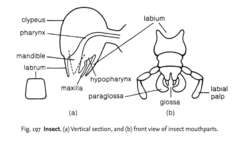insect
Also found in: Dictionary, Thesaurus, Acronyms, Encyclopedia, Wikipedia.
insect
[in´sekt]insect
(ĭn′sĕkt′)insect
any small air-breathing arthropod of the class Insecta, containing organisms that normally in the adult have six legs, three distinct regions to the body (head, thorax and abdomen), one pair of antennae and one or two pairs of wings. Mouthparts are often adapted to the method of feeding, such as biting, piercing and sucking.Abdominal appendages are absent except in the more primitive groups such as springtails. Most insects have a distinct juvenile stage, a nymph (see EXOPTERYGOTA or a larva (see ENDOPTERYGOTA). These undergo METAMORPHOSIS to form the adult. Insects comprise about five-sixths of all known animal species. The class contains the following groups:
Subclass: APTERYGOTA (wingless)
Orders: Protura
Collembola - springtails
Diplura - japygids
Thysanura - bristletails
Subclass: PTERYGOTA (normally winged) EXOPTERYGOTA (HETEROMETABOLA or HEMIMETABOLA)
Orders: Odonata - dragonflies
Ephemeroptera - mayflies
Orthoptera - grasshoppers
Dermaptera - earwigs
Plecoptera - stoneflies
Isoptera - termites
Embioptera - embiids
Mallophaga - biting lice
Anoplura - sucking lice
Psocoptera - book lice
Zoraptera
Hemiptera - bugs
Thysanoptera - thrips
ENDOPTERYGOTA (HOLOMETABOLA)
Mecoptera - scorpion flies
Neuroptera - lacewings
Trichoptera - caddisflies
Lepidoptera - butterflies and moths
Diptera - flies
Siphonaptera - fleas
Coleoptera - beetles
Strepsiptera - stylops
Hymenoptera - ants, bees and wasps
The more important insect orders are described under separate headings.
Patient discussion about insect
Q. an insect bite seems infected and is bleeding... the area under the skin is hard and sore... when pressed it bleeds quite a bit
Q. My friend told me that people who allergic to dust are actually allergic to small insect. Is he fooling with me?
Q. does mosquito bites considered as an edema a bet with a friend- please help solve an issue an help me win a new I pod :)
